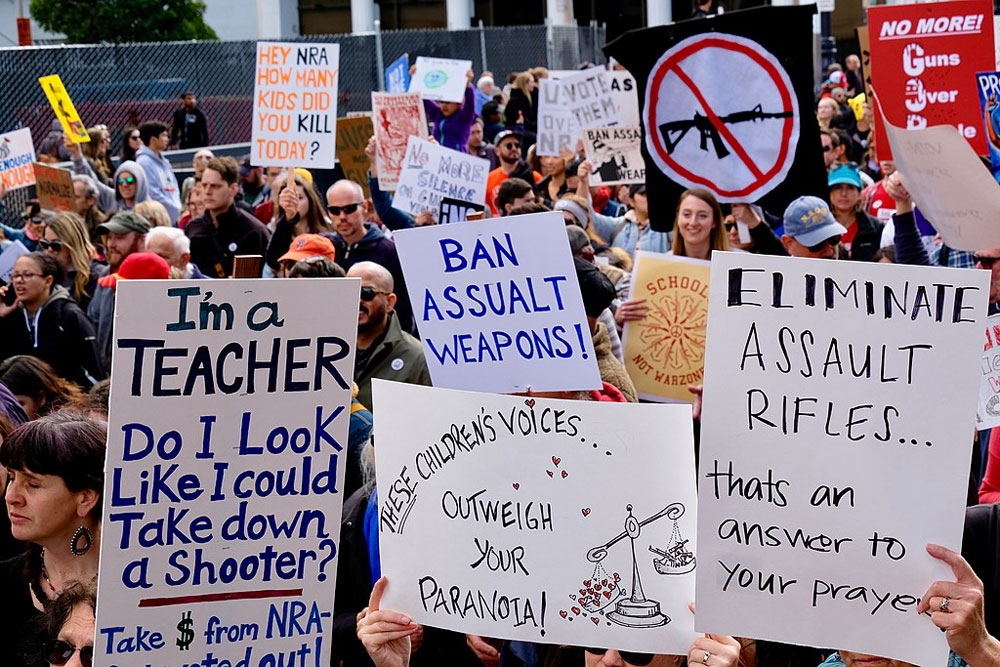
September 4, 2019; Newsweek and Fox News
Problems for the National Rifle Association (NRA) continue to proliferate. As NPQ has reported, it’s struggling with internal leadership and financial issues and seeing cracks in its political positioning, which opposes efforts at gun regulation or gun safety and research legislation at the local, state, and national level. And last week, two more issues were heaped atop the rest. First, the San Francisco Board of Supervisors unanimously declared the NRA a domestic terrorist organization. Adding to this insult, Kroger grocery stores joined Walmart in asking customers to “no longer openly carry firearms” in stores.
The decision in San Francisco follows the shooting at the Gilroy Garlic Festival, which was itself followed by mass shootings in Texas and Ohio. Indeed, according to the most recent estimate from Gun Violence Archive, to date there have been 293 mass shootings nationwide in 2019. In response, a growing movement has emerged to institute gun control measures.
The San Francisco resolution states in part that the NRA “spreads propaganda that misinforms and aims to deceive the public about the dangers of gun violence.” It said the NRA “musters its considerable wealth and organizational strength to promote gun ownership and incite gun owners to acts of violence.”
All countries have violent and hateful people, but only in America do we give them ready access to assault weapons and large-capacity magazines thanks, in large part, to the National Rifle Association’s influence.
The NRA called San Francisco’s action “a reckless assault on a law-abiding organization, its members, and the freedoms they all stand for” and has followed up on its words by filing suit in federal district court. In the suit, the NRA objects less to the terrorist label, which it labels a “frivolous insult,” and more to a provision that calls on city officials to “take every reasonable step to limit those entities who do business with the City and County of San Francisco from doing business with [the NRA].” The lawsuit claims this provision could have a “chilling effect” on free speech.
Sign up for our free newsletters
Subscribe to NPQ's newsletters to have our top stories delivered directly to your inbox.
By signing up, you agree to our privacy policy and terms of use, and to receive messages from NPQ and our partners.
As this was unfolding on the West Coast, from Kroger’s Ohio headquarters and Walmart’s corporate offices in Arkansas came new blows. Both corporations announced they were respectfully asking their customers (other than law enforcement officers) to no longer openly carry firearms in their stores.
Following the deadly shooting at the El Paso Walmart, customers could easily panic at the sight of a fellow shopper legally toting his or her AR-15 in the frozen foods aisle. But that logic seems lost on the NRA. Their response was again one of anger and outrage, which was further inflamed when both Walmart and Kroger said they were “encouraging our elected leaders to pass laws that will strengthen background checks and remove weapons from those who have been found to pose a risk for violence.”
The NRA ignored Kroger’s stance and focused its wrath on Walmart, who they called “shameful” for “succumb[ing] to the pressure of the anti-gun elites.”
“Lines at Walmart will soon be replaced by lines at other retailers who are more supportive of America’s fundamental freedoms,” the group said. “The truth is Walmart’s actions today will not make us any safer. Rather than place the blame on the criminal, Walmart has chosen to victimize law-abiding Americans.”
One may wonder what lies ahead for the NRA. Will their outrage hold them in good stead with their membership? How important is the right to openly carry your guns everywhere? Clearly, Walmart and Kroger value their customers’ feeling of safety and security while shopping in their stores over letting gun owners show off their weapons. As for the San Francisco resolution and their call for others to join them in calling the NRA a domestic terrorist organization, it just might get some traction, as other gun control measures are mired in partisan politics. The NRA is clearly hurting, both internally and externally, and, as gun violence proliferates, finding a sympathetic and supportive audience for its positions may be growing more difficult.—Carole Levine













